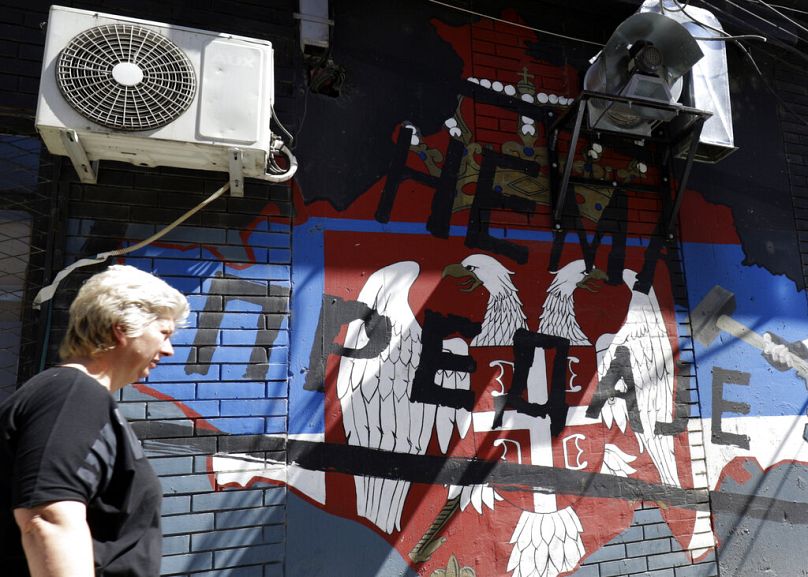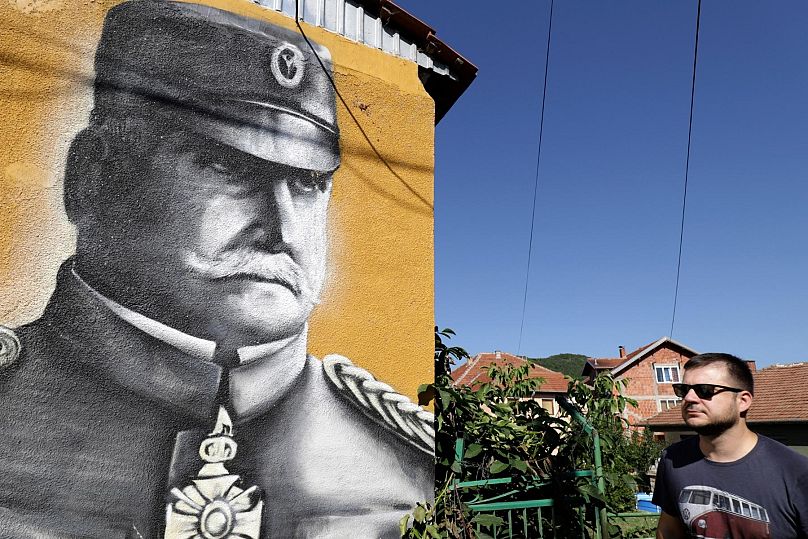Serbia's President Aleksandar Vučić and Kosovo's Prime Minister Albin Kurti met in Brussels on Thursday, in talks facilitated by the EU.
The leaders of Serbia and Kosovo held high-level crisis talks on Thursday which European Union mediators hope will de-escalate growing tensions in the Balkans, where Russia has tried to further increase its influence amid the war in Ukraine.
 ADVERTISEMENT
ADVERTISEMENT
 ADVERTISEMENT
ADVERTISEMENT
Hopes that the rare face-to-face meeting between Serbian President Aleksandar Vučić and Kosovo Prime Minister Albin Kurti, held in Brussels, could produce a major breakthrough were slim.
But officials overseeing the decades-old deadlock between the two neighbours hoped that it would at least reduce the increasingly war-mongering rhetoric coming from both sides.
EU foreign policy chief Josep Borrell spoke after the trilateral meeting and separate one-on-one sessions with the two leaders, stating that the conversations led to Vučić and Kurti agreeing to further talks "to look for solutions in good faith".
"I think that both President Vučić and Prime Minister Kurti understood that there is no alternative to the dialogue in order to solve this problem," Borrell said, adding that although there are significant differences on the final status of the relations between the two, "they agreed to continue discussions on a regular basis in the coming period".
Neither Vučić nor Kurti made any statements whilst in Brussels, with the former's office announcing he will hold a meeting with representatives of the ethnic Serb minority in Kosovo's north on Friday.
In the meantime, both Balkan leaders were said to be attending further meetings with the EU Special Representative for the Belgrade-Pristina Dialogue Miroslav Lajčak and the US representative for the Western Balkans Gabriel Escobar on Thursday evening.
NATO strengthens presence, asks for easing of tensions
NATO Secretary-General Jens Stoltenberg, who met Vučić and Kurti separately in Brussels on Wednesday, said NATO-led troops stationed in Kosovo have strengthened their presence on Kosovo’s northern border with Serbia because of the current tensions.
"But of course, we will act when needed and we will act in a proportionate way because our main aim is to help to reduce tensions and to ensure all communities [have] freedom of movement, to the safety of all communities, including, of course, the Serbs in Kosovo,” Stoltenberg said.
He urged “all parties to engage positively and constructively in the latest round of the EU talks tomorrow”.
Kosovo is a former province of Serbia, which has refused to recognise the country's 2008 declaration of independence following a NATO intervention in 1999 conducted to put a stop to a campaign of ethnic cleansing led by then-President of Serbia Slobodan Milošević.
Following the withdrawal of Belgrade forces, Kosovo has been a UN protectorate with a large NATO peacekeeping mission, KFOR, put on the ground, while the EU has overseen years of talks to normalise the ties between the two sides.
Vučić said it was “a lie" that Serbia wants to intervene in Kosovo but added that a generation of new Serb "kids" living there “do not consider Kosovo as an independent state and view it as a part of Serbia”.
The latest tensions between Serbia and Kosovo soared late last month when Kurti’s government declared that Serbian identity documents and vehicle licence plates would no longer be valid on Kosovo territory.
Under apparent pressure from the West, Kurti postponed the implementation of the measure for a month, to September 1.
Minority Serbs, who live mostly in northern Kosovo, reacted with anger, putting up roadblocks, sounding air raid sirens and firing their guns into the air and in the direction of Kosovo police officers. No one was injured.
Russia involved, Kosovo officials claim
The Kosovo government accused neighbouring Serbia of instigating the riots in order to destabilise the country.
Kosovo Interior Minister Xhelal Sveçla accused Serbia and its ally Russia of triggering and supporting the rioting.
“We see a direct involvement of Belgrade, not just in their rhetoric ... but also in the direct involvement of groups from Serbia, including their security agencies,” he told the Associated Press. “This is inflated and imported from Serbia and Russia, their so-called bigger brother, to incite violence in Kosovo.”
Serbian officials accused Kosovo authorities of planning to chase all remaining Serbs out of Kosovo, saying Belgrade will use “all available means” to stop the “pogrom”.
As the EU appealed for calm, Vučić visited Serbian army headquarters in Belgrade in what was seen as a thinly veiled warning that all options — including military action — were on the table.
There are about 3,800 international peacekeepers stationed in Kosovo and any military intervention there would almost certainly create a wider conflict.
Russian officials and their propaganda, which are very active in Serbia, were quick to join the pro-Serbian narrative, claiming the Serb minority in Kosovo is being oppressed and subjected to violence by the ethnic Albanians — the same narrative used as an excuse by Moscow for invading Ukraine.
There are fears in the West that Russia could use Serbia to destabilise the Balkans and thus shift at least some attention from its war in Ukraine.
Raising the stakes, Russian officials recently started advocating establishing a military base in Serbia, which is surrounded almost entirely by NATO member nations.
“Serbia is militarily neutral and we do not need foreign (military) bases,” Vučić, who is known for his close ties with Russia and China, said after his talks with Stoltenberg.
Serbia, Russia and China do not recognise Kosovo’s independence, which is supported by the US and most other Western states. The EU has said that both Serbia and Kosovo need to normalise their relations if they want to join the 27-nation bloc.












